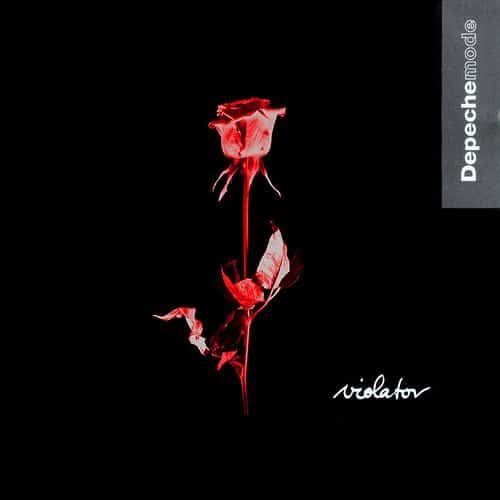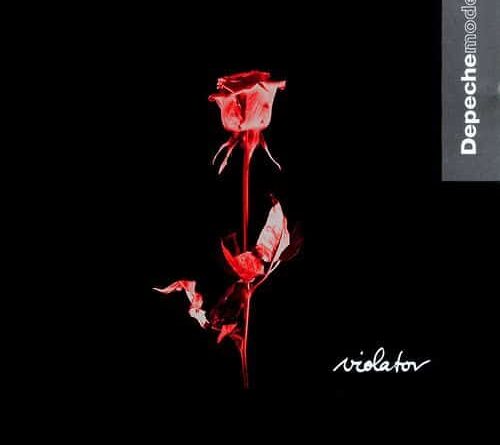HEAVY MUSIC HISTORY: Violator – Depeche Mode
Originally formed as a four piece consisting of Dave Gahan, Martin Gore, Andy Fletcher and Vince Clarke in Basildon, Essex in 1980 – with a name that is a mistranslation of the name of French fashion magazine Dépêche Mode – DEPECHE MODE are undisputedly one of the UK’s most iconic bands. Despite each member’s musical roots in punk, rock and pop, the band’s unique and easily recognisable sound would come from the advent of affordable synthesisers and the increasing popularity of electronic music, little did they know at the time, that they would go on to release numerous albums and become trailblazers and legends within the synth-pop movement and beyond.
Out of the band’s fifteen studio albums, Violator stands head and shoulders above the rest. Released on 19th March 1990, with its iconic red rose album artwork, it is often being cited as the band at their creative peak and without a doubt their finest work. It would be the penultimate album for Alan Wilder, who joined the band in 1982 after the departure of Vince Clarke, he would leave in 1995 after the release of another iconic DEPECHE MODE album – 1993s Songs Of Faith And Devotion.
Recorded in various studios in Milan, Italy, and Denmark in mid-1989, DEPECHE MODE worked with British rock and synth-pop record producer and audio engineer Mark Ellis (pseudonym Flood – worked with the likes of U2, GARY NUMAN, NEW ORDER, NINE INCH NAILS and many more) for the first time. The album would then be mixed by French DJ François Kevorkian. Unlike their previous albums, the band would try a new approach this time round, with Wilder stating in an 1990 NME interview with Stuart Maconie “Usually we begin the making of a record by having extensive pre-production meetings where we decide what the record will actually sound like, then go into a programming studio. This time we decided to keep all pre-production work to a minimum. We were beginning to have a problem with boredom in that we felt we’d reached a certain level of achievement in doing things a certain way.” with Gore adding in the same interview “Over the last five years I think we’d perfected a formula; my demos, a month in a programming studio, etc. etc. We decided that our first record of the ’90s ought to be different.”
These demos would be less complete than Gore’s previous efforts, this came as a request from Wilder, as the rigid, almost-finished demos for Music For The Masses, had a limiting effect on DEPECHE MODE’s creativity as a band. Gore, agreeing to this request, provided sparser demos with basic recordings that consisted of vocals over a simple guitar or organ parts, occasionally with a percussion loop, but overall it was less sequenced material. This allowed the band to have more creative liberties, which lead to songs like Enjoy The Silence being transformed from slow ballad to up-tempo anthem.
Throughout the recording process, Wilder and Flood would strike up a complementary working relationship. Flood would give Wilder the technical support while he was working on arrangements and song textures. In Steve Malins‘ biography of the band, Wilder would state “That’s how we made the group work at that time”, clarified Wilder, “by accepting that we all had different roles and not actually all trying to do the same thing. So we ended up with this unwritten agreement in the band, where we’d all throw together a few ideas at the beginning of a track. Then Fletch and Mart would go away, and they’d come back after we’d worked on it for a while to give an opinion.”
The critical reception was mostly positive, Melody Maker, music critic Paul Lester called Violator “DEPECHE MODE‘s most arresting work to date.” Tim Nicholson of Record Mirror was enthused by the stripped-down quality of the songs and called the album a “compromise between pop music and something a little more sinister”. In a less favourable review, Rolling Stone Magazine‘s Chuck Eddy stated that, Gahan sounds “slimy and self-involved”, and in their attempt to make the album’s listeners dance they “revert to morose pop psychology and then never tell you how come they’re so sad.”
Despite that last remark, the album would release with exceptional commercial success, reaching number one in album charts in Belgium, France, Greece and Spain, coming in at number two in the UK and Germany, and number seven in the US. A sign of DEPECHE MODE’s rising popularity came at a signing event in Los Angeles which was expected to draw only a few thousand fans ended up drawing around 17,000 – with the band being forced to withdraw over security concerns. The tour to support the album, The World Violation Tour, saw the band play several stadium shows in the US. 42,000 tickets were sold within four hours for a show at Giants Stadium, and 48,000 tickets were sold within half-an-hour of going on sale for a show at Dodger Stadium. With 1.2 million fans seeing the tour internationally.
The success of Violator introduced a new and wider audience to DEPECHE MODE which saw them surge in popularity. Fletcher would later recall, “Before this, we’d been going along quite nicely. Then when it came to Violator we inexplicably went huge. It was just incredible, and in many ways we never really recovered from that. After that, we just felt like we wanted to muck it up a bit.”

Violator was originally released on March 19th, 1990 via Mute Records.
Like DEPECHE MODE on Facebook.

